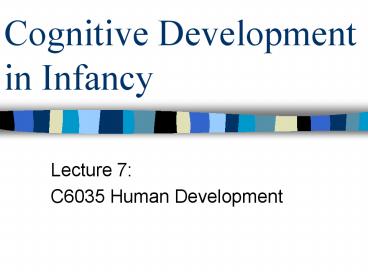Cognitive Development in Infancy - PowerPoint PPT Presentation
1 / 19
Title:
Cognitive Development in Infancy
Description:
Labeling identifying names of objects. How Language Develops. Baby's earliest communication is to attract attention from parents & others in environment ... – PowerPoint PPT presentation
Number of Views:294
Avg rating:3.0/5.0
Title: Cognitive Development in Infancy
1
Cognitive Development in Infancy
- Lecture 7
- C6035 Human Development
2
Piagets Theory of Infant Development
- Stage of Sensorimotor Development
- Schema basic unit for organized pattern of
sensorimotor functioning - Simple Reflexes Piagets first sensorimotor
substage, which corresponds to first month after
birth, where basic means of coordinating
sensation reaction is through reflexive
behaviors
3
Piagets Theory of Infant Development
- First Habits/Primary Circular Reactions
- Second substage developing between 1 4 months
of age, where infant learns to coordinate
sensation types of schemes, or habits - Secondary Circular Reactions is third substage,
developing between 4 8 months of age where
infant becomes more object-oriented moves
beyond preoccupation with the self
4
(No Transcript)
5
Piagets Theory of Infant Development
- Coordination of Secondary Circular Reactions
fourth substage between 8 12 months of age
infant combines previously learned schemes in a
coordinated way - Tertiary Circular Reactions, Novelty, and
Curiosity fifth substage between 12 18 months of
age infants intrigued by variety of properties of
objects what can do with objects - Internalization of Schemes final sixth substage
between 18 24 months infants mental
functioning shifts from sensorimotor to symbolic
plane begin use primitive symbols
6
(No Transcript)
7
Piagets Theory of Infant Development
- Object Permanence infants understanding that
objects events continue to exist, even when
they cannot directly be seen, heard, or touched - Evaluating Piagets Sensorimotor Stage - In this
stage infant can organize coordinate
sensations with physical movements, is
nonsymbolic through most of stage, works way
through six substages of cognitive development
culminates into object permanence or beginning of
symbolic thought
8
(No Transcript)
9
The Information-Processing Perspective
- Habituation when a stimulus is presented to
infant several times eventually becomes bored
with it - Dishabituation an infants renewed interest in a
stimulus - Memory central feature of cognitive development,
pertaining to all situations in which individual
retains information over time - Imitation infant display imitative behaviors in
first 72 hours of life infants of 9 months
imitate actions performed 24 hours earlier
10
Individual Differences In Intelligence
- Developmental Quotient overall score combines
subscores in motor, language, adaptive,
personal-social domains in Gesell assessment of
infants - The Bayley Scales of Infant Development widely
used in assessment of infant development, are
comprised of mental scale, a motor scale infant
behavior profile
11
Early Environmental Influences on Infant
Cognitive Development
- Nutrition studies poor nutrition is detrimental
on cognitive development - Nutritional supplements of protein increased
calories have long-term impact on cognitive
development - Poverty Abecedarian Project found intensive
intervention if begins in infancy has positive
results on childrens intelligence - Researchers agree early intervention for children
reared in poverty has life-long positive effects
on cognitive development
12
Language Development
- What Is Language?
- system of symbols used to communicate with others
- Infinite Generativity individual's ability to
generate infinite number of meaningful sentences
using finite set of words rules - Phonology study of languages sound system
13
Language Development
- Morphology study of what language users know
about units of meaning rules of combining
morphemes which are a meaningful string of
phonemes - Syntax involves ways words are combined to form
acceptable phrases sentences - Semantics refers to meanings of words sentences
14
Language Development
- Biological Influences Linguists know that there
is a biological connection to language, as
children all over the world read language
milestones at about same time - Biological Evolution belief by some scientists
that brain, nervous system vocal system changed
over hundreds of thousands of years
15
Language Development
- Biological Prewriting concept introduced by Noam
Chomsky that each child has a biological
endowment known as the Language Acquisition
Device which enables to detect certain language
categories such as phonology, syntax semantics - Critical Period concept that places learning a
language in certain time periods of a childs
development, interruption or enrichment during
these time periods can have negative or positive
effects respectively
16
Behavioral and Environmental Influences
- How child learns language can be greatly affected
by interaction with environment care-givers - Motherese kind of speech used by mothers other
adults to talk to babies - in a higher pitch than
normal with simple words sentences - Recasting rephrasing statement child has said,
perhaps turning it into question. - Echoing repeating what child says, especially if
incomplete phrase or sentence - Expanding restating in linguistically
sophisticated form, what a child has said - Labeling identifying names of objects
17
How Language Develops
- Babys earliest communication is to attract
attention from parents others in environment - Receptive Vocabulary refers to words an
individual understands which greatly increases
in second year - Spoken Vocabulary begins when infant utters its
first word occurring at approximately 10 to 15
months of age.
18
How Language Develops
- Holophrase Hypothesis a single word can be used
to imply a complete sentence - Infants generally
use holophrastic words. - Telegraphic Speech use of short precise words
to communicate, this speech eliminates
connectives intensifiers. - MLU mean length of utterance, or number of
morphemes per sentence which child produces in a
sample of about 50 to 100 sentences, is a good
index of language maturity
19
Language Overview
- Language is a sequential acquisition in following
pattern - 1. emergence of words basic vocabulary
- 2. transition from one word to word phrase
combinations - 3. transition from single to complex sentences
- Most importantly, language acquisition is
influenced by biological factors as well as
childs rearing environment






























![[PDF] Pediatric Dentistry: Infancy through Adolescence (PEDIATRIC DENISTRY) 5th Edition Ipad PowerPoint PPT Presentation](https://s3.amazonaws.com/images.powershow.com/10085917.th0.jpg?_=20240726126)
